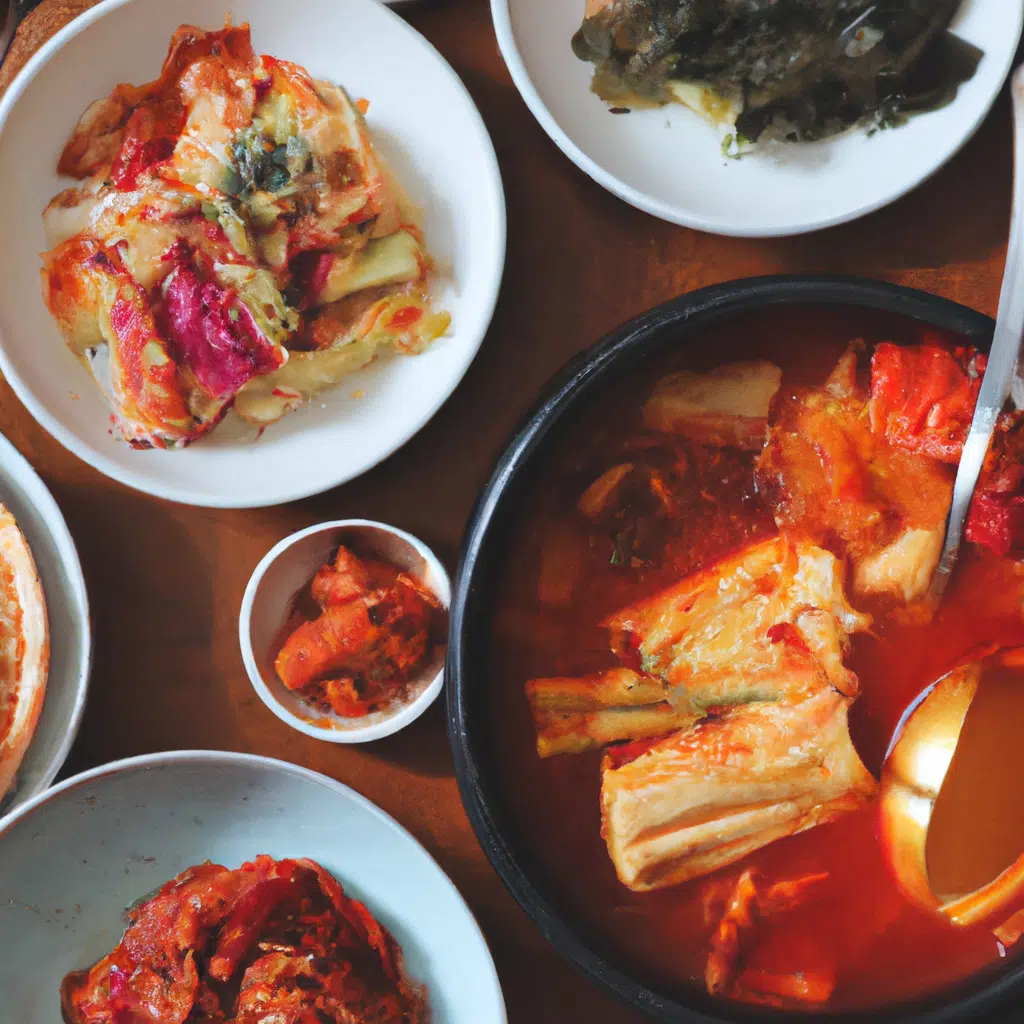
Welcome to our article on the fascinating link between Korean cuisine and mental health! In recent years, there has been growing interest in the impact of food on our overall well-being. Traditional Korean dishes, with their unique flavors and ingredients, have gained recognition for their potential mood-boosting effects. In this article, we will delve into the science behind this connection, exploring the nutritional aspects, cultural influences, and specific Korean dishes that contribute to enhancing mental health.
The Role of Nutrition in Mental Health
Before we dive into the specifics of Korean cuisine, it’s important to understand the role of nutrition in mental health. Research has shown that what we eat can have a profound impact on our mood, cognitive function, and overall mental well-being. Certain nutrients, such as omega-3 fatty acids, B vitamins, antioxidants, and amino acids, play a crucial role in maintaining optimal brain function and supporting emotional stability.
Korean Cuisine: A Nutritional Powerhouse
Korean cuisine, known for its diverse range of flavors and ingredients, offers a wealth of nutritional benefits. The traditional Korean diet is characterized by its emphasis on vegetables, fermented foods, lean proteins, and a variety of grains. This combination provides a balanced and nutrient-rich approach to eating, which can positively influence mental health.
Fermented Foods: A Gut-Brain Connection
One of the key components of Korean cuisine is the inclusion of fermented foods, such as kimchi, doenjang, and gochujang. These foods undergo a fermentation process that enhances their flavor and nutritional profile. Fermented foods are rich in probiotics, which are beneficial bacteria that promote a healthy gut microbiome.
Emerging research suggests a strong link between gut health and mental health. The gut-brain axis, a bidirectional communication pathway between the gut and the brain, plays a crucial role in regulating mood and cognitive function. By consuming fermented foods, you can support a healthy gut microbiome, potentially improving mental well-being.
Abundance of Vegetables and Antioxidants
Korean cuisine is renowned for its extensive use of vegetables, which are packed with essential vitamins, minerals, and antioxidants. Antioxidants play a crucial role in protecting the body against oxidative stress, which can contribute to mental health disorders such as depression and anxiety.
Traditional Korean dishes like bibimbap, japchae, and gimbap are vibrant with an array of colorful vegetables, ensuring a diverse range of antioxidants are incorporated into the diet. By consuming these dishes, you provide your body with the necessary nutrients to combat oxidative stress and support your mental health.
Lean Proteins and Amino Acids
Protein is an essential macronutrient that plays a critical role in the production of neurotransmitters, which are crucial for proper brain function and mood regulation. Korean cuisine often includes lean protein sources such as tofu, seafood, and lean meats like chicken and beef.
These protein-rich dishes provide the body with amino acids, the building blocks of neurotransmitters. For example, tryptophan, found in abundance in Korean cuisine, is a precursor to serotonin, a neurotransmitter known for its mood-enhancing effects. By incorporating lean proteins into your diet, you can support the production of neurotransmitters that promote positive mental well-being.
Cultural Influences on Mental Health
In addition to its nutritional benefits, Korean cuisine’s cultural significance also contributes to its positive impact on mental health. Food is deeply intertwined with Korean culture, and the act of sharing meals with family and friends is highly valued. This communal aspect of dining fosters social connections and a sense of belonging, which are vital for our mental well-being.
The importance placed on balanced meals and the practice of mindful eating further enhance the positive psychological impact of Korean cuisine. The emphasis on savoring each bite and enjoying the flavors promotes a mindful approach to eating, allowing individuals to fully engage with their senses and cultivate a sense of gratitude for the nourishment they receive.
Traditional Korean Dishes for Mental Health
Now that we understand the nutritional and cultural aspects of Korean cuisine, let’s explore some traditional dishes that can specifically contribute to improving mental health.
Kimchi: A Probiotic Powerhouse
Kimchi, a spicy fermented cabbage dish, is a staple in Korean cuisine. Packed with probiotics, vitamins, and fiber, kimchi offers numerous health benefits, including potential mood-boosting effects. The probiotics in kimchi support a healthy gut microbiome, which, as we discussed earlier, plays a significant role in mental health.
Bibimbap: A Rainbow of Nutrients
Bibimbap, a colorful mixed rice dish, is not only visually appealing but also a nutritional powerhouse. Packed with a variety of vegetables, lean protein, and healthy fats, bibimbap provides a well-rounded meal that supports overall mental well-being. The combination of different ingredients ensures a diverse range of nutrients, including antioxidants, vitamins, and minerals.
Samgyetang: A Nourishing Ginseng Soup
Samgyetang, a traditional Korean ginseng chicken soup, is renowned for its nourishing properties. This comforting dish combines tender chicken, ginseng, jujubes, garlic, and various herbs. Ginseng, a medicinal herb, has been associated with improved cognitive function and reduced stress levels. The combination of ingredients in samgyetang makes it a soothing and nutritious option to support mental health.
Conclusion
In conclusion, traditional Korean cuisine offers a surprising link between food and mental health. Through its emphasis on nutritional powerhouses like fermented foods, abundant vegetables, lean proteins, and cultural practices of mindful eating and communal dining, Korean cuisine provides a holistic approach to supporting mental well-being. By incorporating these mood-boosting dishes into your diet, you can nourish both your body and mind, reaping the benefits of a vibrant and healthy lifestyle.
Remember, the path to mental well-being is multifaceted, and while nutrition plays a significant role, it should be complemented by other lifestyle factors such as regular exercise, quality sleep, and stress management techniques. Embrace the flavors and benefits of Korean cuisine, and embark on a journey towards improved mental health and overall wellness.
